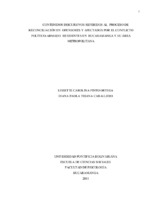| dc.contributor.advisor | Molina Valencia, Nelson | |
| dc.contributor.author | Pinto Ortega, Lisette Carolina | |
| dc.contributor.author | Triana Caballero, Diana Paola | |
| dc.coverage.spatial | Seccional Bucaramanga. Universidad Pontificia Bolivariana. Escuela de Ciencias Sociales. Facultad de Psicología | spa |
| dc.coverage.temporal | 2011 | |
| dc.date.accessioned | 2013-11-05T19:22:55Z | |
| dc.date.available | 2013-11-05T19:22:55Z | |
| dc.date.created | 2011-05-24 | |
| dc.date.issued | 2013-11-05 | |
| dc.identifier.uri | http://hdl.handle.net/20.500.11912/1150 | |
| dc.description | 111p.: (pdf); il; tablas | spa |
| dc.description.abstract | La investigación se abordó desde un diseño no experimental tipo descriptivo de enfoque cualitativo y respondió a la pregunta ¿Cuáles son los contenidos discursivos referidos al proceso de reconciliación en ofensores y afectados por el conflicto político – armado en Bucaramanga y su área Metropolitana? Teóricamente se consideró a Gergen, K. (2007) desde el construccionismo social, a Garay, Iñiguez, & Martínez (2003) desde la psicología discursiva y la comprensión multidimensional de la reconciliación propuesta por Walker y Gorsuch. El diseño metodológico de la investigación contó con viñetas y una entrevista semiestructurada en dos comunidades de afectados y ofensores sociales, con quienes se realizó 40 entrevistas. Entre los resultados se encontró que las dos comunidades de afectados y ofensores enfatizan la reconciliación como un proceso a largo plazo que puede darse siempre y cuando cuente con la presencia de condiciones óptimas que permitan abordarlo desde lo íntimo hasta llegar a lo social y nacional. Los afectados señalan a Dios como elemento principal en el proceso del perdón y la aplicación de justicia como componente que favorece la reconciliación. En cambio, los ofensores postulan la reconciliación como un proceso en el cual puedan ser reconocidos. Por esto, se concluye que para que se dé un proceso de reconciliación es fundamental el establecimiento de condiciones que favorezcan la justicia, la reparación integral y el reconocimiento de las dos comunidades de actores sociales. | spa |
| dc.description.abstract | The investigation was approached from a design non experimental descriptive type of qualitative focus and it answered the question ¿Which are the discursive contents referred to the process of reconciliation in offenders and affected by conflict politic-armed in residents of Bucaramanga and your metropolitan area? Theoretically it was considered Gergen, K. (2007) from the social constructionism, Garay, Iñiguez, & Martínez (2003) from the discursive psychology and the multidimensional understanding of the Reconciliation proposed by Walker and Gorsuch. The methodological design of the investigation counted on vignettes and one interview semi-structured in two communities of affected and social offenders, with who was carried out 40 interviews. Among the results it was found that both communities of affected and offenders they emphasize the reconciliation like a long term process that it can be given provided it has the presence of good conditions that it allows to approach it from the intimate thing until arriving to the social and national. Those affected point out to God like main element in the process of the pardon and the application of justice like component that it favors the reconciliation. On the other hand the offenders postulate the reconciliation like a process in which they can be recognized. For this reason, it concludes that so that a reconciliation process is given it is fundamental the establishment of conditions that they favor the justice, the integral repair and the recognition of the two communities of social actors. | |
| dc.language.iso | es | |
| dc.publisher | Universidad Pontificia Bolivariana | spa |
| dc.rights | Attribution-NonCommercial-NoDerivatives 4.0 International | * |
| dc.rights.uri | http://creativecommons.org/licenses/by-nc-nd/4.0/ | * |
| dc.subject | Tesis y disertaciones académicas | spa |
| dc.subject | Área metropolitana de Bucaramanga | spa |
| dc.subject | Conflicto armado | spa |
| dc.subject | Reconciliación | spa |
| dc.subject | Justicia social | spa |
| dc.title | Contenidos discursivos referidos al proceso de reconciliación en ofensores y afectados por el conflicto político-armado residentes en Bucaramanga y su área metropolitana | spa |
| dc.type | bacherlorThesis | spa |
| dc.rights.accessRights | openAccess | spa |
| dc.type.hasVersion | publishedVersion | spa |
| dc.identifier.instname | instname:Universidad Pontificia Bolivariana | spa |
| dc.identifier.reponame | reponame:Repositorio Institucional de la Universidad Pontificia Bolivariana | spa |
| dc.identifier.repourl | repourl:https://repository.unab.edu.co/ | |


